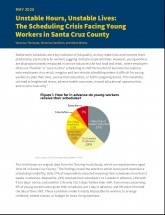Stable work schedules are a key indicator of job quality, as they make lives and incomes more predictable, particularly for workers juggling multiple responsibilities. However, young workers are disproportionately employed in service industries like fast food and retail, where employers often use “flexible” or “just-in time” scheduling to shift the burden of business fluctuations onto employees. As a result, irregular and last-minute scheduling makes it difficult for young workers to plan their lives, pursue their education, or fulfill caregiving duties. This instability can lead to heightened stress, adverse health outcomes, missed educational opportunities, and income insecurity.
This brief draws on original data from the Thriving Youth Study, which surveyed workers aged 18 to 34 in Santa Cruz County. The findings reveal the extent to which local youth experience scheduling instability.
Copublished by the UCLA Chicano Studies Research Center and the UC Santa Cruz Center for Labor and Community.

